- Home
- Alex Berenson
The Prisoner
The Prisoner Read online
ALSO BY ALEX BERENSON
The Wolves
Twelve Days
The Counterfeit Agent
The Night Ranger
The Shadow Patrol
The Secret Soldier
The Midnight House
The Silent Man
The Ghost War
The Faithful Spy
The Number (nonfiction)
G. P. PUTNAM’S SONS
Publishers Since 1838
An imprint of Penguin Random House LLC
375 Hudson Street
New York, New York 10014
Copyright © 2017 by Alex Berenson
Penguin supports copyright. Copyright fuels creativity, encourages diverse voices, promotes free speech, and creates a vibrant culture. Thank you for buying an authorized edition of this book and for complying with copyright laws by not reproducing, scanning, or distributing any part of it in any form without permission. You are supporting writers and allowing Penguin to continue to publish books for every reader.
Library of Congress Cataloging-in-Publication Data
Names: Berenson, Alex, author.
Title: The prisoner / Alex Berenson.
Description: New York : G.P. Putnam’s Sons, [2017] | Series: A John Wells novel ; 11
Identifiers: LCCN 2016041437 (print) | LCCN 2016049104 (ebook) | ISBN 9780399176159 (hardcover) | ISBN 9780698407510 (EBook)
Subjects: LCSH: Wells, John (Fictitious character)—Fiction. | United States. Central Intelligence Agency—Fiction. | Undercover operations—Fiction. | Intelligence officers—Fiction. | BISAC: FICTION / Suspense. | FICTION / Espionage. | GSAFD: Suspense fiction. | Spy stories.
Classification: LCC PS3602.E75146 P75 2017 (print) | LCC PS3602.E75146 (ebook) | DDC 813/.6—dc23
LC record available at https://lccn.loc.gov/2016041437
This is a work of fiction. Names, characters, places, and incidents either are the product of the author’s imagination or are used fictitiously, and any resemblance to actual persons, living or dead, businesses, companies, events, or locales is entirely coincidental.
Version_1
For PEN America, and all the writers around the world jailed for their words
CONTENTS
Also by Alex Berenson
Title Page
Copyright
Dedication
Epigraph
PROLOGUE
PART ONE Chapter 1
Chapter 2
Chapter 3
Chapter 4
Chapter 5
Chapter 6
Chapter 7
Chapter 8
PART TWO Chapter 9
Chapter 10
Chapter 11
Chapter 12
Chapter 13
Chapter 14
Chapter 15
Chapter 16
Chapter 17
PART THREE Chapter 18
Chapter 19
Chapter 20
Chapter 21
Chapter 22
Chapter 23
Chapter 24
Chapter 25
Chapter 26
Chapter 27
Chapter 28
Chapter 29
Chapter 30
EPILOGUE
Acknowledgments
About the Author
Everyone had done well out of the war
except for those who had fought in it.
—KATE ATKINSON, A God in Ruins
PROLOGUE
HARRAN, TURKEY
THE HORSES KNEW.
They shied and stumbled as the Syrian smuggler named Mahmoud led them out of the battered trailer. Four brown geldings, wide-eyed and frightened. Resigned to trouble ahead. Kareem Batta wasn’t sure how, but they knew.
The tallest of the four, a handsome youngster with a white blaze on the left side of his head, was more skittish than the others. As his hooves touched the crumbly Anatolian soil, he swished his tail, pushed up the ramp. But Mahmoud jerked his reins and muttered at him. After a moment, he quit the protest.
The beasts feared the men around them even more than the trip they were about to take. They were gentle animals. Batta didn’t like using them this way. But he had no choice. They were the best way over the border into Syria, the only realistic way to avoid the Islamic State’s jihadis. Those modern-day trolls watched the roads from every angle, with checkpoints and rolling patrols and even drones. They needed no excuse but their black flags to snatch unlucky travelers.
Batta circled the geldings, examining them like a trainer at a yearling auction. He was hardly an expert. He’d grown up in a two-bedroom apartment in Detroit. But he’d ridden enough in the last five years to spot trouble. These four looked strong. They breathed easily despite the early afternoon heat. Their backs were straight, their eyes bright. Not like other nags smugglers had foisted on him. Batta had learned to check the hard way, after a mount dropped under him on a rocky trail in the Anti-Lebanon Range, two hundred miles and a dozen front lines southwest. He had left the four-legged corpse behind and staggered out of Syria on a broken foot.
“Think I bring losers?” Mahmoud said in English. “When my brother and I go, too?” He was a skinny twenty-something who wore black jeans and motorcycle boots. His brother, Ajmad, was even skinnier, and even younger, with a wispy mustache and smooth cheeks. They had taken Batta to Syria twice before, first to meet a Kurdish commander, an easy run, then a riskier mission to scout a warehouse where hostages were supposedly being held. The warehouse had turned out to be an ammunition depot, but the brothers brought Batta back to Turkey with his head attached. A win. A tie, anyway.
Batta still didn’t entirely trust Mahmoud. But Batta didn’t entirely trust anyone over here except his brothers-in-arms from the Central Intelligence Agency’s Special Operations Group, or SOG. Even the Turkish intelligence service played both sides. The Islamic State of Iraq and Syria, the Free Syrian Army, the Martyrs of Syria Brigades, the Soldiers of Islam, the People’s Protection Unit, and a hundred others . . . In Syria and Kurdistan, outsiders couldn’t tell the players with a program. Sometimes even the combatants were confused. Batta had seen a firefight sputter out after the commanders realized that their bosses had agreed to a cease-fire the week before. A cosmic joke, even if the guy who’d been shot in the head wasn’t laughing.
Mahmoud pulled out a bag of sugar cubes, gave two to each gelding. “A little scared, but they’ll be fine once we move.”
“They’re not bad,” Batta said in Arabic. Though he’d been born in Michigan, he was fluent, thanks to his parents, immigrants from Jordan. “I’ve seen worse, anyway.” He ran his hand over the tall gelding’s flank. Sorry, buddy. If it makes you feel any better, I’m nervous, too. “What’s his name?”
“Baraq. Why, you want to buy him?”
“Only if he can grow wings.” In the Quran, Baraq was the name of the steed who had flown Muhammad to Heaven.
“Money-back guarantee.”
On that note . . . Batta handed Mahmoud a backpack, cheap blue nylon with a faded Mickey Mouse logo.
“M-I-C-K-E-Y . . .” Mahmoud unzipped it, thumbed the stacks inside. “This is one hundred,” he said in English. “We said three-fifty.” Three hundred fifty thousand dollars. A fair price for two days’ work, considering the risk of beheading by the friendly folks south of the border.
The man they were bringing out was worth more than that to Batta’s bosses at L
angley. Batta knew him as Abu Ibrahim, an Islamic State bureaucrat who had helped the CIA track the group’s oil-smuggling routes. He now promised information about its secret bank accounts in the United Arab Emirates, if the agency could just get him out alive.
“Three hundred fifty,” Mahmoud repeated, with the slight sulk that came so naturally in Arabic. “Wahid, ithnan, thalatha . . .” One, two, three . . .
“When I come back.” They both knew the terms, and they both knew Batta wouldn’t stiff Mahmoud. The agency would never have another safe trip over the border.
“If you don’t?”
Exactly. “I thought you planned to bring me home.”
“Insh’allah. But things happen.”
“In that case, send an after-action report, explaining the lessons learned, with a self-addressed, stamped envelope and request payment within sixty days.”
Batta saw that Mahmoud didn’t get the joke, but the smuggler smiled anyway. “All right, Kareem. I trust you.” He called to Ajmad, and together the brothers trotted to the Mitsubishi pickup pulling the trailer. A burly man in his fifties stepped from the truck and hugged them both.
“If they don’t come back, I’ll kill you,” the man yelled to Batta.
If they don’t come back, you won’t have to worry. I’ll be dead already. Batta just waved.
Mahmoud tossed the knapsack into the truck. The man stepped in, gunned the engine, pulled out with the trailer rattling behind him. Then the brothers were alone with Batta and his partner, Bill Girol.
Girol had joined the agency after nine years in the Marine infantry, mostly in Recon. He and Batta made a strange pair. Batta was huge, six-seven and two-forty, with fence-post arms, curly hair, and a beard that had faded from brown to reddish blond in the Turkish sun. Girol had prematurely gray hair and calm brown eyes. He was five-six and easy to underestimate. He weighed one-fifty, benched three-fifty, and seemed to need no sleep at all. After four years around Syria, he spoke decent Arabic, too. But he would never pass for a local, and he preferred to let Batta do the talking. Even back at the CIA base in Gaziantep, Girol kept quiet. Batta had once made the mistake of asking him about his Navy Cross, which ranked second only to the Medal of Honor as an award for military valor.
For bravery in the course of my divorce, Girol said. Any more questions, genius? From then on, he always called Batta genius. Batta called him Mighty, as in Mouse. Batta figured they’d each take a bullet for the other. He hoped not to find out.
“Ready?” Mahmoud said.
“Let’s go over it once more.” A final run-through never hurt.
Mahmoud pulled a battered map from his jeans, unfolded it against Baraq’s flank like a cowboy, then changed his mind and laid it on the ground as Girol and Batta squatted on either side. “Okay, we’re here, yes. Harran.” He pointed to a spot north of the border.
Harran was ancient enough to have earned a mention in Genesis for playing home to Abraham in his pre-Isaac days. As far as Batta could tell, the village hadn’t changed much since. It lay about twenty kilometers north of Akçakale, a dusty Turkish town so close to the border that the crossing split it in half, like El Paso and Ciudad Juárez. The Syrian side was called Tal Abad. Kurdish militias had recently retaken it from the Islamic State.
This region was something of an afterthought in the Syrian conflict. The serious fighting took place to the west, as the Islamic State battled Bashar al-Assad’s army and other militias for control of big cities like Homs. But despite its relative unimportance, Tal Abad was the border crossing closest to Raqqa, the capital of the Islamic State. Abu Ibrahim lived there.
The Islamic State could almost certainly have retaken Tal Abad from the Kurds by shifting a couple of thousand jihadis from the front lines. But its commanders had chosen not to try. They were almost inviting an attack on Raqqa. They seemed to believe the city’s defenses were impenetrable. Or maybe they didn’t want to move fighters from the battles to the west. Whatever their logic, Batta wasn’t arguing. By backing off the border, the Islamic State had made this mission possible.
Mahmoud moved his finger to the border, left of the Akçakale–Tal Abad crossing.
“Nine kilometers west of Tal Abad, a new cut in the wire.” To defend itself against the Islamic State, Turkey had moved thousands of soldiers into Anatolia. But the border stretched almost a thousand kilometers. Monitoring it all was impossible. In the eastern half of the country, strings of razor wire were all that separated the two countries. “Big enough to ride through. Some Kurds put it there. Maybe three weeks ago. Daesh, they don’t know.”
Arabic-speaking enemies of the Islamic State called it Daesh. The nickname denied the group’s Muslim legitimacy by stripping the word Islamic from it. Jihadis hated the name and had been known to cut the tongue out of anyone they caught saying it.
“You sure they don’t know?”
“The Kurds control down to Ain Issa now. Daesh sticks to the crossing.” In other words, Islamic State spies still watched the vehicles that passed through Tal Abad, probably putting every license plate into a database. But by giving up the border, they had lost their chance to patrol the fence. “We cross after dark, ride to Ain Issa, seventy-five kilometers from here.” Ain Issa was a speck of a town northwest of Raqqa. The Kurds had taken it from the Islamic State a few weeks after winning Tal Abad. It was friendly territory. “Rest tomorrow, a warehouse my friend owns, make sure the horses are fine, nobody bothers us.”
“Then tomorrow night—”
Mahmoud stroked a finger across the map, following the east–west road, the M4. “Everything down here is Daesh, Daesh, Daesh.” He spoke the forbidden name with the relish of a child cursing. “All around Raqqa, checkpoints. What we do, tomorrow, after sunset, we ride south. Different dirt paths we can take, quiet, only farmers, they won’t bother us. They don’t like Daesh either, they want everyone to leave them alone. We get close to the river”—the Euphrates. “Good cover there, palm groves and canals. Close to fifty kilometers.”
He hooked his finger to the right, along the river. “Now, I told you two weeks ago, Daesh knows this way. Of course. It’s Raqqa, they know every way in. But a friend of mine went through last week with cigarettes, he didn’t see anyone. Most of the time they don’t guard it. No cars come, only horses, so it doesn’t bother them much. Anyway, they like cigarettes, too. We have twenty cartons in case we run across them.” As a cover story and also for bribes.
“And if they won’t take the cigarettes?”
“They’re men, they take bribes.”
Batta shook his head. They both knew plenty of Islamic State jihadis were true believers and couldn’t be bribed.
“Let me handle it,” Mahmoud said. “I know these men. If I see a problem, real problem, I say, Everyone likes Marlboro. In English, so this one”—Mahmoud nodded at Girol—“understands. That means we get out, no matter what.”
“Everyone likes Marlboro.”
“Nam. But, Insh’allah, they watch somewhere else tomorrow night.”
Insh’allah, Insh’allah, Insh’allah—God willing. Like God paid any attention to this ugly little war. Like its endless barbarity and cruelty wouldn’t have made Him sick in the unlikely event He noticed it. Insh’allah. Batta heard the phrase a hundred times a week, a tic of language he couldn’t escape. He hated it more each time. Truly, he had grown to hate everything about this place. He stayed because he hated the Islamic State most of all. The week before, an aid worker had told him about three girls who’d clawed out their own eyes after months of being passed among the jihadis. Girls, not women. Thirteen, twelve, and eleven. They had all decided to blind themselves rather than endure more rapes. I thought, They’ll kill me now, the oldest girl had told the aid worker. They’ll have to. Even they won’t want a girl with holes in her face. Instead, the jihadis had dumped her at a border crossing, literally thrown her off the back of a pickup t
ruck. It’s better now, though. This way, I can’t look at myself.
“Remember, the cigarettes are last,” Mahmoud said. “If they stop us, first they want to see our cards”—identity cards. Batta’s claimed he was from Lebanon, and Girol’s from Bosnia, a way to explain his less-than-perfect Arabic. “They ask us to pray, we pray.” Mahmoud looked at Girol. “You can pray?”
“Nam”—Yes.
“Show me. The Fatiha”—the Quran’s first surah, or verse—“and another.”
Girol turned south to face Mecca. “Bismillah al-Rahman al-Rahim al-hamdu lillahi rabbil’alamin—”
“Enough,” Mahmoud said. “They don’t really care, once they hear a few words, they just want to make sure you’re Sunni.” The two sects prayed in slightly different ways. The most obvious difference was that the Shia kept their hands by their sides while the Sunni held them together at the waist.
“Good,” Girol said. “I only know one more verse.”
“A prayer to be named later,” Batta said. He wished Girol had practiced more. But even if Girol memorized the Quran cover to cover, their cover identities would withstand only brief questioning. They would depend on Mahmoud’s quick tongue, a well-timed bribe, and the laziness of whoever spotted them. Not great odds. If they were detained for a longer interrogation, they would have no chance at all.
Batta already knew he would die before letting that happen.
—
IN GAZIANTEP a month before, Batta’s SOG commander—an ex–Delta op named Oden Durette—had sounded almost embarrassed to be pitching this op. No one had ever tried an exfil from Raqqa.
“I’m asking you and Bill because you’re the best. You say no, that’s it.”
“Dude can’t get to the border on his own? He needs a taxi?”
“Guys like him have to have permission to leave the city and he’s afraid to ask. I don’t know for sure, but my impression, he was working for the Syrian oil company when our friends came to town. He’s Sunni and good at the job, so they left him to do it, but they don’t really trust him. And he doesn’t have the stones to break for it without us holding his hand.”

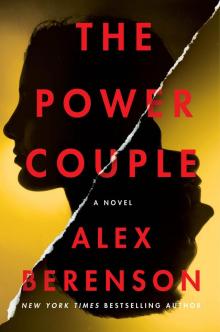 The Power Couple
The Power Couple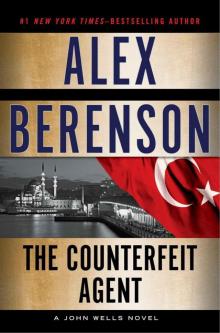 The Counterfeit Agent
The Counterfeit Agent The Midnight House
The Midnight House The Prisoner
The Prisoner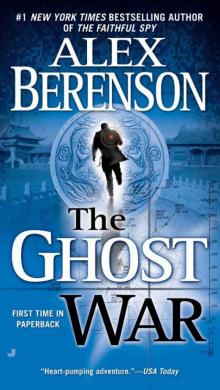 The Ghost War
The Ghost War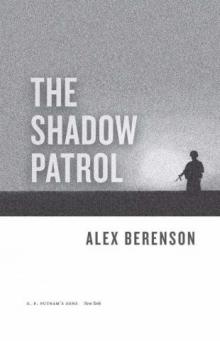 The Shadow Patrol jw-6
The Shadow Patrol jw-6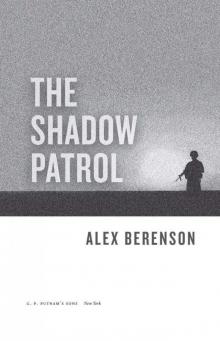 The Shadow Patrol
The Shadow Patrol The Deceivers
The Deceivers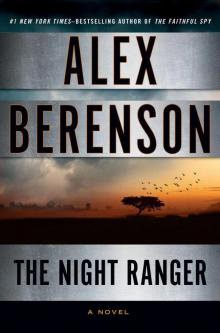 The Night Ranger jw-7
The Night Ranger jw-7 The Faithful Spy
The Faithful Spy The Prince of Beers (Kindle Single)
The Prince of Beers (Kindle Single)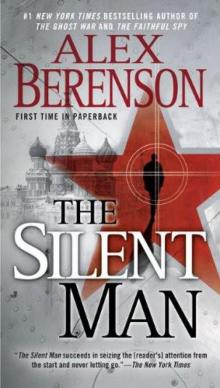 The Silent Man jw-3
The Silent Man jw-3 The Silent Man
The Silent Man The Wolves
The Wolves The Midnight House jw-4
The Midnight House jw-4 The Ghost Agent
The Ghost Agent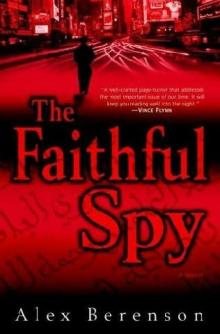 The Faithful Spy jw-1
The Faithful Spy jw-1 The Prince of Beers
The Prince of Beers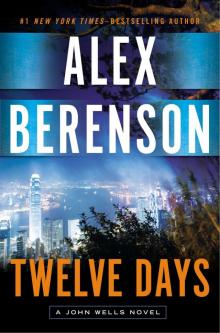 Twelve Days
Twelve Days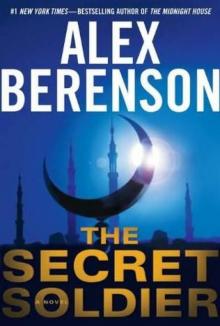 The Secret Soldier jw-5
The Secret Soldier jw-5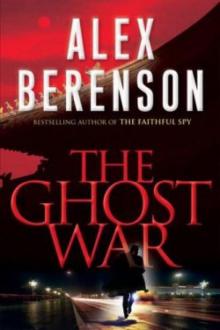 The Ghost War jw-2
The Ghost War jw-2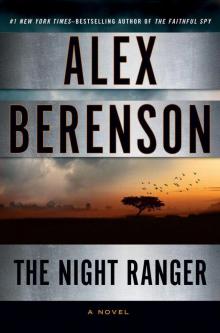 The Night Ranger
The Night Ranger